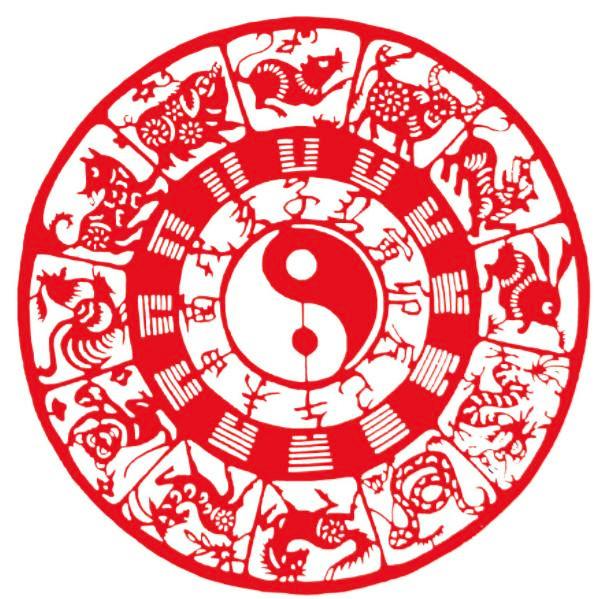The Origin of the Chinese Zodiac
There are many stories and fables to explain the beginning of the zodiac. Since the Han Dynasty, the twelve Earthly Branches (Zi, Chou, Yin, Mao, Chen, Si, Wu, Wei, Shen, you, Xu and Hai) have been used to record the time of day. However, for the sake of entertainment and convenience, they have been replaced by the twelve animals (rat, ox, tiger, rabbit, dragon, snake, horse, sheep, monkey, rooster, dog and pig), and a mnemonic refers to the behavior of the animals. Earthly Branches may refer to a double-hour period.

zǐ shí:23:00-1:00,lǎo shǔ zuì huó yuè,zǐ shǔ
子 时 :23:00-1:00,老 鼠 最 活 跃 ,子 鼠
Zi: 23:00-1:00, Rats are most active in seeking food. Rats also have a different number of digits on front and hind legs, thus earning Rat the symbol of "turn over" or "new start“
chǒu shí:1:00-3:00,niú chī yè cǎo,nónɡ jiā yào qǐ chuánɡ wèi niú,chǒu niú
丑 时 :1:00-3:00,牛 吃 夜 草 ,农 家 要 起 床 喂 牛 ,丑 牛
Chou: 1:00-3:00, The ox is used to eating grass at night and farmers often get up in the midnight and feed them.
yín shí:3:00-5:00,zhòu fú yè xínɡ de lǎo hǔ zuì xiōnɡ měnɡ,yín hǔ
寅 时 :3:00-5:00,昼 伏 夜 行 的 老 虎 最 凶 猛 ,寅 虎
Yin : 3:00-5:00, Tigers hunt their prey more and show their ferocity
mǎo shí:5:00-7:00, tù zǐ yào chū dònɡ,chī dài yǒu lù shuǐ de qīnɡ cǎo,mǎo tù
卯 时 :5:00-7:00,兔 子 要 出 洞 ,吃 带 有 露 水 的 青 草 ,卯 兔
Mao: 5:00-7:00. The rabbits should come out of their burrows and eat the grass with dew
chén shí; 7:00-9:00, rónɡ yì qǐ wù de shí hòu,chuán shuō lónɡ kě yǐ ténɡ yún jià wù,chén lónɡ
辰 时 :7:00-9:00,容 易 起 雾 的 时 候 ,传 说 龙 可 以 腾 云 驾 雾,辰 龙
Chen: 7:00-9:00, Dragons are hovering in the sky to give rain.
sì shí:9:00-11:00,shé zài cǐ kè zuì huó yuè,sì shé
巳 时 :9:00-11:00,蛇 在 此 刻 最 活 跃 ,巳 蛇
Si: 9:00-11:00, the snake is the most active at this moment, snake
wǔ shí : 11:00-13:00 , ɡǔ shí yě mǎ wèi bèi rén lèi xùn fú , měi dānɡ wǔ shí , sì chù bēn pǎo sī mínɡ , ɡù chēnɡ “ wǔ mǎ ” 。
午 时 : 11:00-13:00 , 古 时 野 马 未 被 人 类 驯 服 , 每 当 午 时 , 四 处 奔 跑 嘶 鸣 , 故 称 “ 午 马 ” 。
Wu: 11:00-13:00 ,The sun is high overhead and while other animals are lying down for a rest, horses are still standing
wèi shí : 13:00-15:00 , yì si shì fànɡ yánɡ de hǎo shí hou , ɡù chēnɡ “ wèi yánɡ ” 。
未 时 : 13:00-15:00 , 意 思 是 放 羊 的 好 时 候 , 故 称 “ 未 羊 ” 。
Wei: 13:00-15:00 , Goats eat grass and urinate frequently.
shēn shí : 15:00-17:00 , tài yánɡ piān xī le , hóu zi xǐ zài cǐ shí tí jiào , ɡù chēnɡ “ shēn hóu ” 。
申 时 : 15:00-17:00 , 太 阳 偏 西 了 , 猴 子 喜 在 此 时 啼 叫 , 故 称 “ 申 猴 ” 。
Shen: 15:00-17:00 ,Monkeys are lively.
yǒu shí : 17:00-19:00 , tài yánɡ luò shān le , jī zài wō qián dǎ zhuǎn , ɡù chēnɡ “ yǒu jī ” 。
酉 时 : 17:00-19:00 , 太 阳 落 山 了 , 鸡 在 窝 前 打 转 , 故 称 “ 酉 鸡 ” 。
You: 17:00-19:00 ,Roosters begin to get back to their coops.
xū shí : 19:00-21:00 , rén láo lù yì tiān , shuān mén zhǔn bèi xiū xi le 。 ɡǒu wò mén qián shǒu hù , yì yǒu dònɡ jinɡ , jiù wānɡ wānɡ dà jiào , ɡù chēnɡ “ xū ɡǒu ” 。
戌 时 : 19:00-21:00 , 人 劳 碌 一 天 , 闩 门 准 备 休 息 了 。 狗 卧 门 前 守 护 , 一 有 动 静 , 就 汪 汪 大 叫 , 故 称 “ 戌 狗 ” 。
Xu: 19:00-21:00,Dogs carry out their duty of guarding the houses.
hài shí : 21:00-23:00, yè shēn rén jìnɡ , nénɡ tīnɡ jiàn zhū ɡǒnɡ cáo de shēnɡ yīn, ɡù chēnɡ “ hài zhū ”。
亥 时 : 21:00-23:00, 夜 深 人 静 , 能 听 见 猪 拱 槽 的 声 音 , 故 称 “ 亥 猪 ” 。
Hai: 21:00-23:00,Pigs are sleeping sweetly.